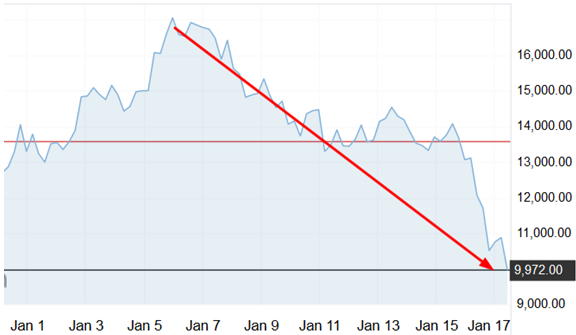Some Reasons Bitcoin Won't Survive:
Bitcoin arguably the worl's most popular cryptocurrency has endured a rough 2018 so far. After enjoying a banner year in 2017, price are down about 20% so far this year.At around $11,500 the price of one bitcoin is more than 40% below its record high of around $20,000 touched in mid-December, wiping approximately $140 billion off its market cap.

1.Rules and Regulations
After last year's remarkable 1,900 % rally,Bitcoin has started 2018 on a rocky note. ongoing chatter of tighter rules and stricter regulations has ratted South Korea, and just this past weekend india, were the latest countries to come out charging against Bitcoin trading, with South korea's Justice minister saying that the government was considering a "ban" on cryptocurrency exchange trading.Many of india's largest private banks have suspended cryptocurrency exchange accounts tied to Bitcoin trade. law enforcement agencies in South Korea also began investigating the country's largest exchanges for tax evasion.
china effected a similar ban last year and has recently signaled that it will escalate its calm down on cryptocurrency trading, targeting online platforms and mobile apps that offer exchange-like services.
adding to fears over rising scrutiny from global regulators, a director at Germany's central bank said this week that any attempt to regulate cryptocurrencies must be on a global scale, as national or regional rules would be hard to enforce on a virtual, border less community.
adding to fears over rising scrutiny from global regulators, a director at Germany's central bank said this week that any attempt to regulate cryptocurrencies must be on a global scale, as national or regional rules would be hard to enforce on a virtual, border less community.
2. Skyrocketing Fees
Skyrocketing transaction fees fundamental changing Bitcoin. Originally, one of Bitcoin's biggest selling points was that transaction payment would be fast, convenient and most importantly -cheap."The cost of mediation increases transaction cost, limiting the minimum practical transaction size and cutting off the possibility for small casual transactions," wrote Bitcoin founder Satoshi Nakamoto in the white paper announcing the technology. up until the beginning of 201, Bitcoin fees tended to be well below $1. But in recent months, its growing popularity has outstripped the network's ability to cope with soaring demand.
As a result, the Bitcoin network as we know it today is radically different from what it was in its infancy. People are currently paying around $25 on average to make transactions using the digital currency, much higher than seen in the early days of 2017, according to data by Bit infro Charts.
3.Mining Problems
China's government is planning to shut down Bitcoin miners as part of its latest crackdown on the cryptocurrency. on January 10, the Leading group of Internet Financial Risks Remediation request that local governments make an "orderly exit" from industry.The news is significant because China mines about 60% of the world's Bitcoin, making it by far the biggest Bitcoin mining country in the world. The fact that the majority of Bitcoin mining occurs in china could bring chaos to the Bitcoin community
Another cause for concern: one Bitcoin mining session originally created 50 Bitcoin, then the number dropped to 25 and now it stands at roughly 12.5 some forecast that by 2020, it will fall to 6.25 bitcoins which wil make mining unprofitable.
If Bitcoin isn't mined, transactions aren't approved and new Bitcoin aren't produced. Over 16,800,000 Bitcoins have been mined as of january 13, getting close to the maximum amount of 21 million coin mined once all of the Bitcoin are mined it means supply can no longer grow.
4. Slowing Transaction Times
Right now, it takes an average time of around 200 minute to confirm a single Bitcoin transaction, according to Blockchain.com the average time for the month of December was a whopping 2,322 minutes, or roughly 38 hours, with market experts blaming the unprecedented interest in the digital currency for clogging up the blockchain network.Slow transaction speeds have led to a number of splitis in the original Bitcoin blockchain. In August, the blockchain was forced to split in two in an event known as a "hard work." this led to the creation of a Bitcoin spinoff called Bitcoin cash. Another fork occurred in October, birthing another Bitcoin offshoot called Bitcoin gold, as the community attempted to take measures to increase the size of blocks on the network.
in comparison, Ripple's network can the settle up to 1,500 transactions every second. other alt-coins also have the ability to enable transactions in seconds.
For instance, an Ethereum transaction takes under 20 second to confirm.
However, those figures pale in comparison to traditional paymnet service
gaints like Visa, which can confirm up to 24,000 transactions per second
No comments:
Post a Comment